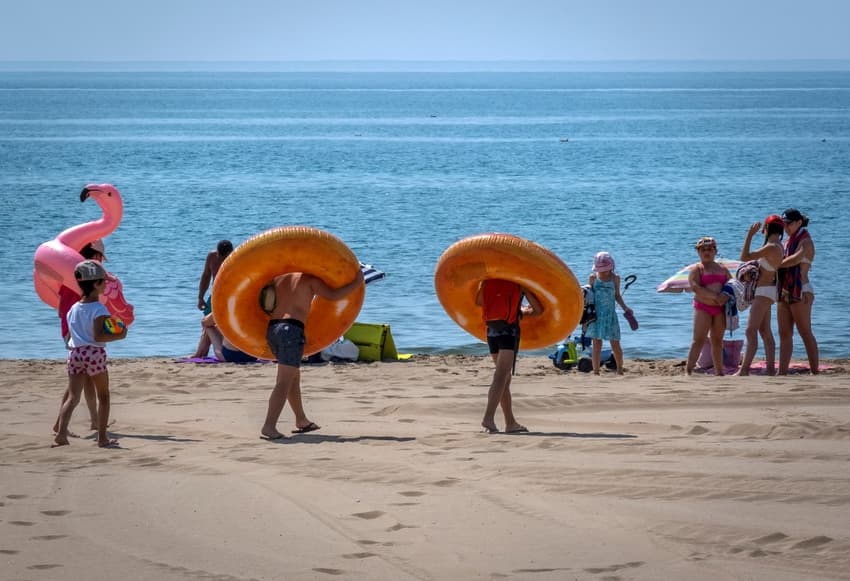Parents in France urged to avoid 41 sun creams for children

Parents in France should be aware of "very harmful" substances in a wide range of well-known sunscreen brands for children, warn two French environmental associations.
Of 71 different sun-cream products labelled "for children", 41 contained "extremely worrying" substances, according to a new study by WECF France and Agir pour l'Environnement (Act for the Environment).
The products tested - creams, milks and sprays - were of well-known brands such as Nivea, Bioderma, Garnier, Eucerin, Avène, A-Derma and Vichy, found in pharmacies, supermarkets and organic stores.
In total the organisations identified 29 harmful substances and classified them on a scale of three steps, yellow ("worrying"), orange ("very worrying") and red ("extremely worrying").
Nine of the 71 products were found to contain at least 10 harmful substances.
The worst of the tested products was found to be Lancaster's "Sun for kids comfort anti-sand SPF 50+," with as many as 15 harmful substances.
All the products contained at least one problematic substance, the study found.
In addition to containing substances that could be harmful to children's health, around 20 of the products were found to contain chemical UV filters frequently used by the cosmetic industry, but which scientists have established as detrimental to the environment.
These featured among the list of the total of 10 substances the organisations classified as "extremely worrying", which all were subject to scientific consensus as causing "grave health dangers" because of their cancerous, hormone-changing and toxic particles.
The organisations called for a ban on the use of these substances in products.
A total of seven substances were found to be "very worrying," which meant that they were known to have an irritating effect on skin.
The remaining 12 substances were particles characterised as "less damaging impact on health or environment."
Organic better
The study revealed that organic sunscreens to be generally less harmful than the other products, although several organic products also contained substances classified as "worrying" and "very worrying".
The organisations asked for more transparency on labelling and called out companies on making it difficult for consumers to choose good products.
They said people needed to be able to themselves make conscious choices when buying a sunscreen, and told parents to "beware of misleading or fanciful allegations sometimes present on packaging."
Labels like "protects the environment," "anti-stain formula," "more water resistant "or even "made under medical supervision" were often deceitful, they wrote in the report.
Children should get a new layer of sunscreen applied "every two hours for the protection to be efficient," they wrote, urging parents not to shy away from sunscreens that leave a white mark on the skin, "as this normally proves that it doesn't contain harmful nanoparticles".
You can access the full report here with a list or all the products tested and the different harmful substances they contain.
The study did not test the protective efficiency of the products.
Comments
See Also
Of 71 different sun-cream products labelled "for children", 41 contained "extremely worrying" substances, according to a new study by WECF France and Agir pour l'Environnement (Act for the Environment).
The products tested - creams, milks and sprays - were of well-known brands such as Nivea, Bioderma, Garnier, Eucerin, Avène, A-Derma and Vichy, found in pharmacies, supermarkets and organic stores.
In total the organisations identified 29 harmful substances and classified them on a scale of three steps, yellow ("worrying"), orange ("very worrying") and red ("extremely worrying").
The organisations called for a ban on the use of these substances in products.
A total of seven substances were found to be "very worrying," which meant that they were known to have an irritating effect on skin.
The study revealed that organic sunscreens to be generally less harmful than the other products, although several organic products also contained substances classified as "worrying" and "very worrying".
Labels like "protects the environment," "anti-stain formula," "more water resistant "or even "made under medical supervision" were often deceitful, they wrote in the report.
Children should get a new layer of sunscreen applied "every two hours for the protection to be efficient," they wrote, urging parents not to shy away from sunscreens that leave a white mark on the skin, "as this normally proves that it doesn't contain harmful nanoparticles".
You can access the full report here with a list or all the products tested and the different harmful substances they contain.
The study did not test the protective efficiency of the products.
Join the conversation in our comments section below. Share your own views and experience and if you have a question or suggestion for our journalists then email us at [email protected].
Please keep comments civil, constructive and on topic – and make sure to read our terms of use before getting involved.
Please log in here to leave a comment.